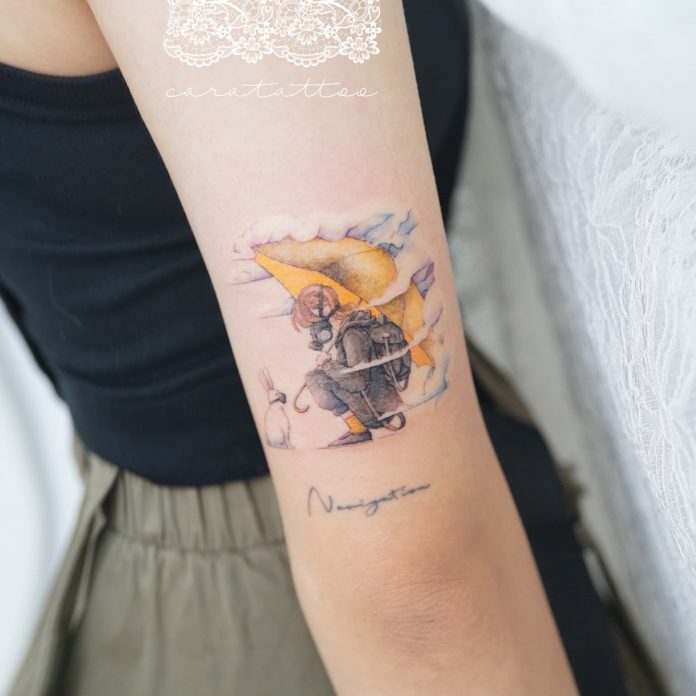Though the anti-ELAB movement is publicly dying down, some are choosing to get tattoos as a way for the movement to live forever.
By Gloria Chan Yi Lam
Sammy* received her first anti-Extradition Law Amendment Bill (anti-ELAB) tattoo on December 18, 2019.
The university student’s tattoo features a girl in black clothes who wears a respiratory mask and carries a yellow umbrella. The girl crouches in front of a rabbit that also wears a mask. The tattoo is on the upper back of Sammy’s right arm.
The design incorporates several iconic symbols of the social movement – black clothes, respiratory masks, and yellow umbrellas.
Sammy actively participated in the movement in 2019. “I feel like I have experienced a lot. I resonate so much with the tattoo,” the 22-year-old says.
The anti-ELAB movement began in 2019. It was triggered by a proposed bill that would have allowed criminal suspects to be extradited to mainland China.
Protests initially began over fears that the bill would expose Hong Kong residents and visitors to the mainland Chinese legal system and undermine Hong Kong’s autonomy. The protests have since developed into a broader movement for democracy and police accountability.
The social movement has died down during the pandemic. When Sammy looks at the tattoo at home, memories of the movement come to her mind. “I have the tattoo in memory (of the anti-ELAB movement),” she says.
“When I look at my tattoo, I feel touched. The tattoo reconnects me with my memories. It also reminds me of Hongkongers’ resilience, as I believe that they will not give up on the movement,” she adds.
Sammy does not mind letting her tattoo show. “I want others to see my tattoo and think about the meaning behind it. I will be in despair if I cannot express myself freely and legally with a tattoo on my arm in Hong Kong,” she says.
“I want others to see my tattoo and think about the meaning behind it.”
Sammy says she may get more tattoos related to the anti-ELAB movement if she comes up with other designs. “A tattoo is a sign of memory. If I do not remove it, it will stay with me forever. I hope my memories of those days stay in my heart forever,” she says.
Tattoo artist Cara Wong Cho-ki has been helping clients create tattoos related to the anti-ELAB movement since November 2019. Sammy is one of them.

Wong recalls that she had many clients asking for tattoos about the movement between November 2019 and February 2020.
“There are customers requesting this kind of tattoo occasionally (during the pandemic),” Wong says, adding that no client asked for tattoos related to politics before the anti-ELAB movement.
“Some want to remember this movement and remind themselves about it. They think that it is an important part of their lives,” Wong says.
Wong has always refused to do couple tattoos, since she thinks customers may regret having their tattoo if they break up in the future.
But she does not think customers would regret getting anti-ELAB tattoos. “I do not think my customers will change their political beliefs. Maybe people have argued about the best way to fight for the demands (of the social movement), but their point of view and their values will never change,” Wong says.
Wong says she has no legal concerns in doing tattoos related to the anti-ELAB movement despite the introduction of the National Security Law. “I appreciate customers’ courage in getting tattoos related to the movement. There is a need to speak out, especially in turbulent times,” she says.
“There is a need to speak out, especially in turbulent times.”
Chiu Chi-yue, a psychology professor and Dean of Social Science at the Chinese University of Hong Kong, says having a tattoo can be read as a commitment to a memory that is significant to someone.
“They consider the movement personally important to them, and they want to commit the struggles they have gone through in this event to their memories,” Chiu says.
Chiu says putting on a tattoo can also be seen as a sign related to one’s social identity.
“When you see people put on symbols representing certain movements, they may be telling other people that they identify with the values behind it. (People who have anti-ELAB tattoos) may use their tattoos to show others that they belong to this movement,” he says.
Chiu reminds people to be aware of the boundaries of self-expression.
“People are free to express themselves, but they are also responsible for their choices. We shouldn’t make remarks that are unfair to other people or groups,” he says.
Chiu cites people who get tattoos about a social movement as an example. “(The tattoo) could be about a human rights movement. It could be about a world peace movement. It could be about an animal rights movement. It could be about a gender equality movement. The psychological process and reasons (behind getting the tattoo) are probably the same,” he says.
*Name changed at interviewee’s request
Edited by Patricia Ricafort
Sub-edited by Bonita Wong







































